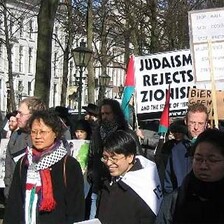The Electronic Intifada 25 February 2004
“ICJ: Justice or Politics” was a statement displayed on a banner at a pro-Israel demonstration in The Hague on Monday. In the last three days I have been covering the oral proceedings taking place before the international court of justice and the demonstrations here in The Hague for the British-based organization Arab Media Watch. Whilst the pleadings proceeded smoothly it has been interesting to note how few countries have come out in support of the Palestinians. Out of 191 countries in the General Assembly only 12 of them participated in the oral pleadings taking place before the ICJ. This is perhaps a reflection of the politics that have been taking place behind the scenes.
The only international organisations to have submitted oral pleadings are the League of Arab States and the Organization of the Islamic Conference. The U.N. did not even submit an oral pleading and did not allocate maps to the Court in their written statement. One would have thought that the U.N. would have had something to say as the General Assembly has been discussing the question of Palestine since 1947 even before the creation of the state of Israel.
Most interestingly, the Egyptians have not submitted an oral pleading to the ICJ despite the fact that one of the judges on the bench is Egyptian. As an Arab country with a long history of involvement in the Palestine question one would have thought it appropriate that they be present. After all Jordan, despite enormous pressure exerted on it to refrain from submitting an oral pleading, did so.
Amid accusations of anti-Semitism, the European states have not joined in the oral proceedings before the ICJ either. And yet, it is Europe that the Palestinians have traditionally turned to for support. Even the Netherlands, home to the ICJ, the tribunal for the Former Republic of Yugoslavia, and the newly established International Criminal Court is not present. This is despite public opinion in Europe being against the wall.
This is not to say that in refraining from taking part in the proceedings these countries support Israel’s permission. It is more than likely that these countries — especially in Europe — did not want to participate in the oral pleadings because of the unpopular stance they have taken in opposing the whole process. It is much easier to provide a written statement attracting little public attention than to participate in the oral proceedings. This may have been the reason why so many countries in Europe did not back up their written statements in Court.
Here in The Hague, the mayor Wim Deetman accused the Israeli embassy of inflaming tensions supplying 926 photographs to pro-Israel demonstrators protesting at the proceedings taking place before the ICJ. The Mayor also rejected an invitation by his counterpart in Jerusalem to visit that city and at a Palestinian rally in support of the proceedings before the ICJ the Dutch personality Greta Duisenberg led a march of leading Dutch Jewish anti-Zionists.
Most countries do not doubt that Israel in constructing the wall inside occupied Palestinian territory is a violation of international law. Britain’s Foreign and Commonwealth Secretary, Jack Straw came out with a statement on Monday that the wall is illegal but that resorting to the ICJ to solve the matter is not the right way to go about things. If the British accept that the wall is illegal then surely they must accept that this is a legal matter and that the ICJ has competence to give an advisory opinion as the General Assembly has requested it do so.
According to the United States, the ICJ has no place in this issue. They say, the road map, the plan for a Middle East peace settlement is the way forward. It is noteworthy that the road map contains little reference to international law. It remains to be seen whether the ICJ will go ahead and rule that the wall is violating international law. However there can be no doubt that some countries that would have liked to submit oral pleadings before the ICJ caved into pressure from Washington.
Related Links:
Victor Kattan has a degree in law and has worked in the occupied Palestinian territories.





